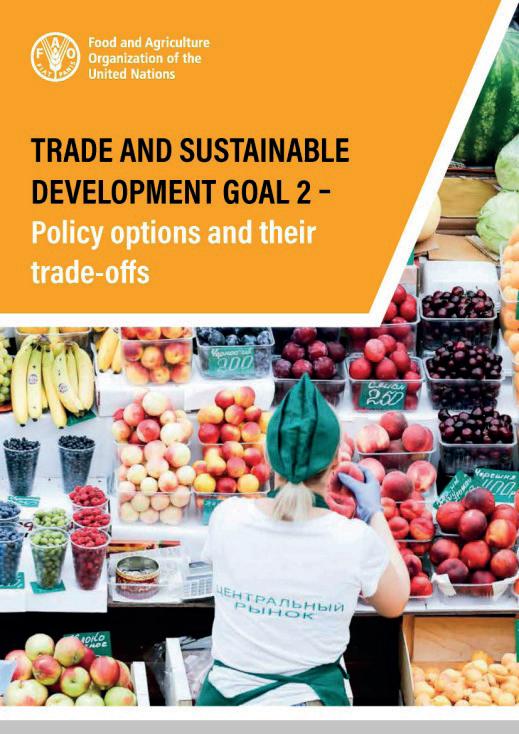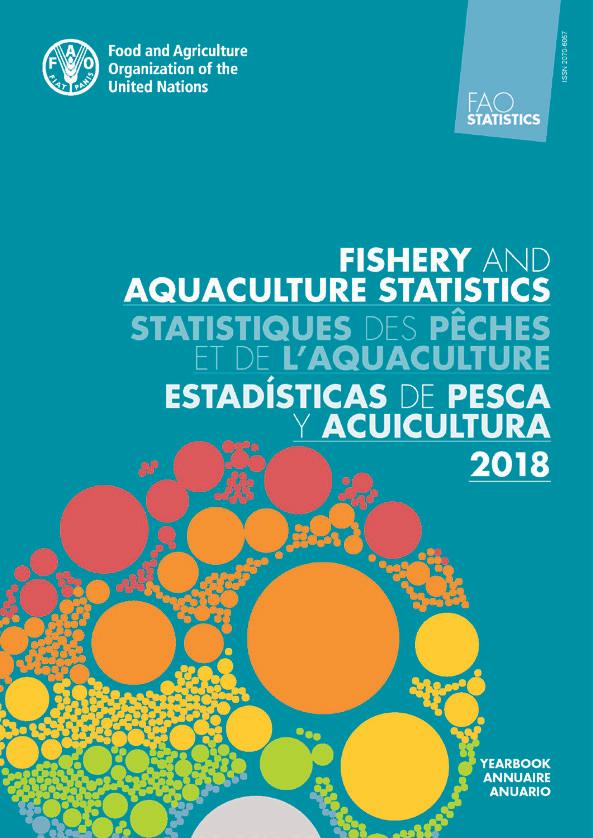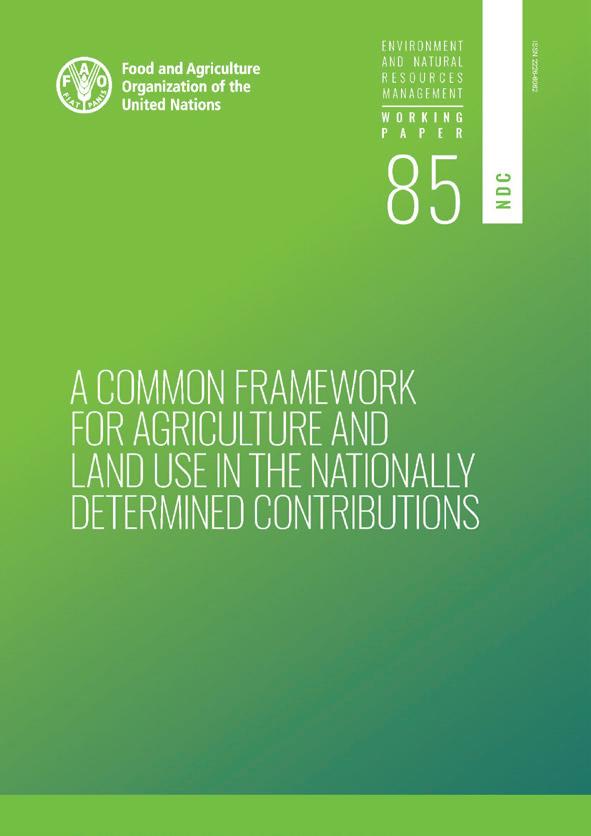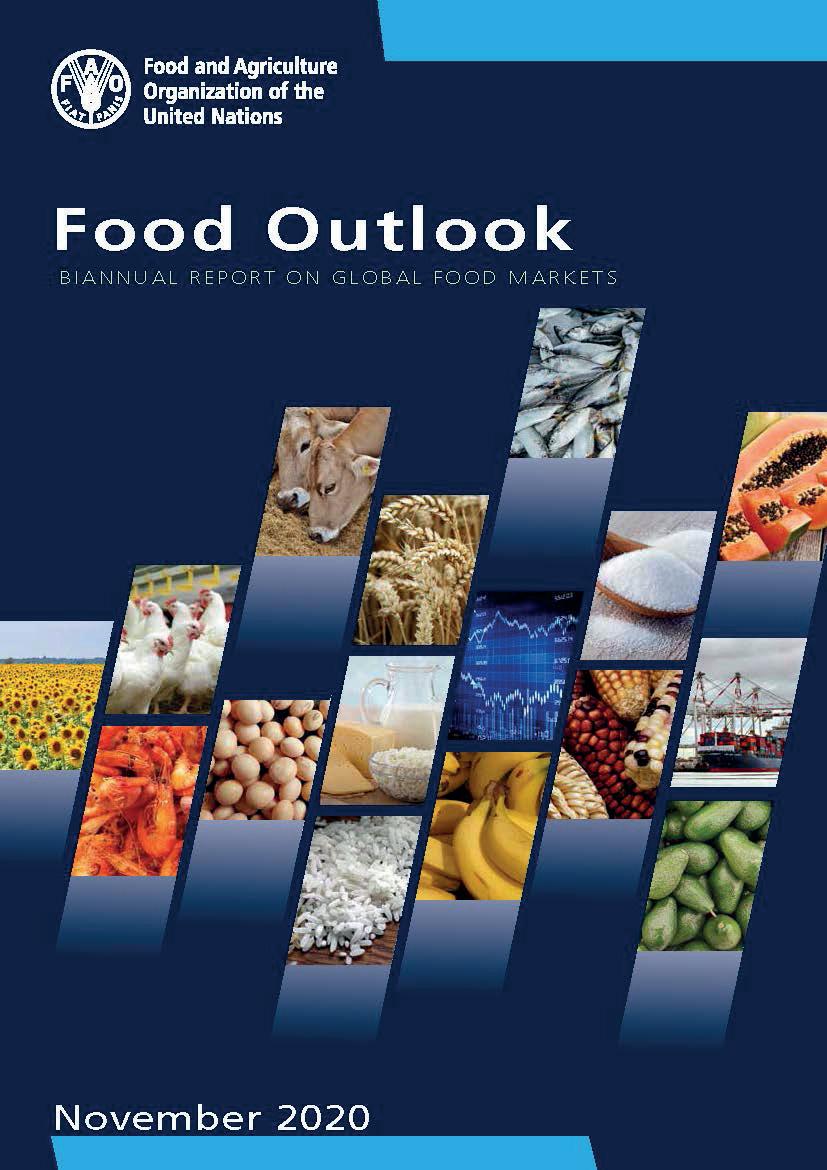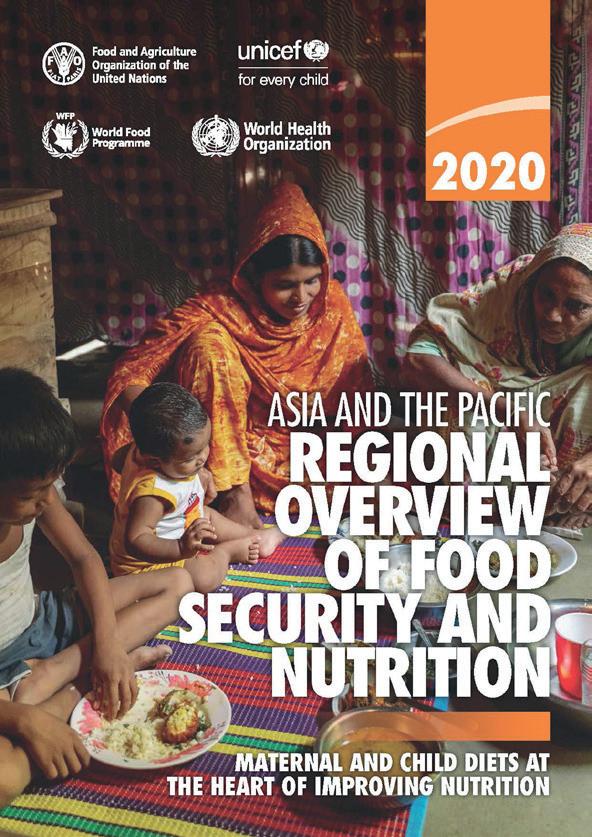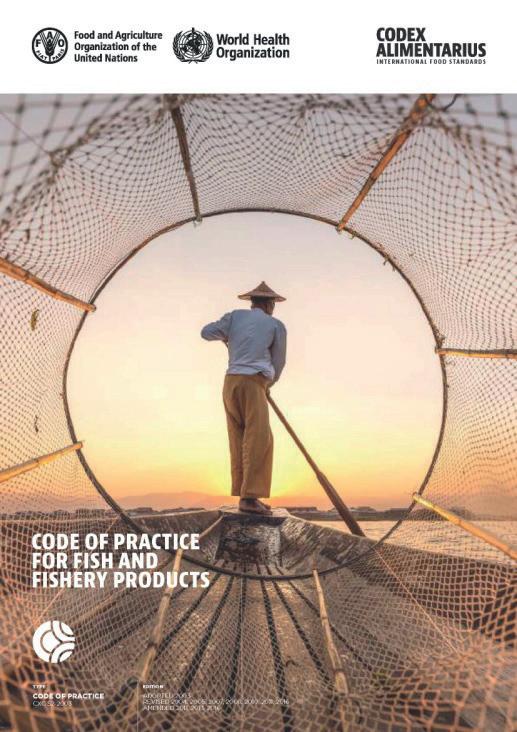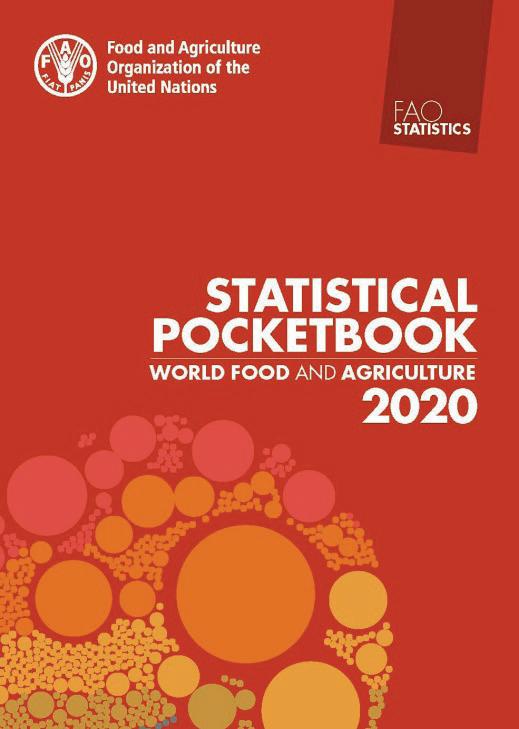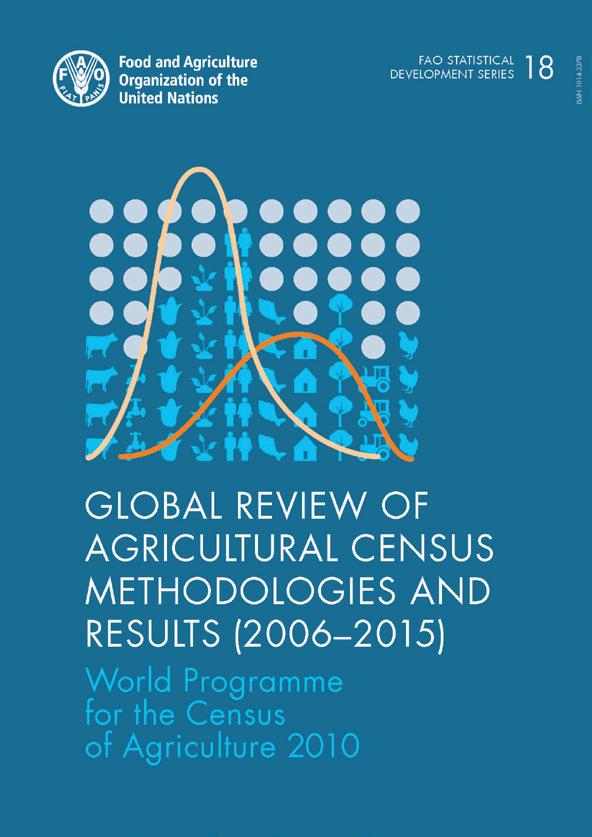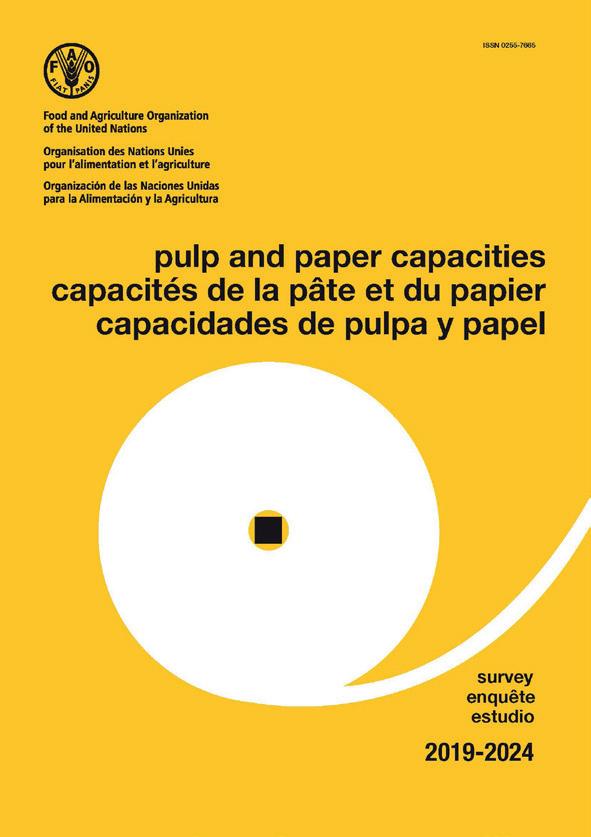
12 minute read
Economic and social development
from News 1/2021
by CIHEAM-Bari
LibraryNewsletter OrganicAgriculture Newsletter Economic Books Fisheries Agriculture Food and nutrition Aquaculture Natural resourcesMAIBDocumentation Center Documentation Center Mediterranean Agronomic Institue of Bari N° 1 - 2021 - January-Februarywww.iamb.it
land productivity gaps in irrigated and rain fed agriculture. WaPOR Version 2 was launched in June 2019 based on extensive internal and external validation and quality assessment. This document describes the methodology used to produce Version 2 of the data at the 250m (Level 1), 100m (Level 2) and 30m (Level 3) resolution distributed through the WaPOR portal.
Advertisement
Download publication
Cite this content as: FAO. 2020. WaPOR database methodology: Version 2 release, April 2020. Rome.
back to index
ECONOMIC AND SOCIAL DEVELOPMENT
Empowering young agri-entrepreneurs to invest in agriculture and food systems. Policy recommendations based on lessons learned from eleven African countries.
Type of publication: Book Author: Fiedler, Y. Publisher: FAO Year of publications: 2020 Place of publication: Rome, Italy Other Entities Involved: Swiss Federal Office for Agriculture Pages: 66 p. ISBN: 978-92-5-133342-6 doi: https://doi.org/10.4060/cb1124en
Agrovoc: agrifood sector; youth employment; entrepreneurs; support measures; empowerment; investment promotion;Africa
Abstract: Measures that empower young agri-entrepreneurs should be a key component of a sustainable developmentcentred investment promotion strategy. The very realization of future generations’ food security, the sustainable transformation of food systems and the combat against unemployment and distress migration all depend upon the successful implementation of strategies that make the agri-food sector more attractive for the youth. This, in turn, requires smart policy responses that will help young investors overcome the numerous barriers they face – access to finance, land, information and technical services, to name but the most crucial ones. Since 2017, FAO has provided support to African and South-East Asian countries in identifying key challenges for young agri-entrepreneurs and good practices through participatory capacity analyses and strategic planning processes which were carried out with, and for the youth. This report summarizes the main findings and lessons learned from FAO’s work with eleven African countries – Côte d’Ivoire, Guinea Conakry, Malawi, Mali, Mauritania, Mozambique, Namibia, Senegal, South Africa, Tunisia and Uganda. It identifies key challenges and policy recommendations regarding youth’s access to finance; land; technical services and information; as well as the engagement of youth in policy-making processes. The report also contains a set of five overall key policy recommendations for the empowerment of young agri-entrepreneurs.
Download publication
Cite this content as: Fiedler, Y. 2020. Empowering young agri-entrepreneurs to invest in agriculture and food systems – Policy recommendations based on lessons learned from eleven African countries. Rome.
LibraryNewsletter OrganicAgriculture Newsletter Economic Books Fisheries Agriculture Food and nutrition Aquaculture Natural resourcesMAIBDocumentation Center Documentation Center Mediterranean Agronomic Institue of Bari News DOCUMENTATION CENTRE - CIHEAM BARI from the Library
Agricultural finance and the youth: prospects for financial inclusion in Kenya. Rural Employment - Knowledge materials – Rural Finance
Type of publication: Book Author: Benni, N., Berno, D., Hitomi, H. Publisher: FAO Year of publications: 2020 Place of publication: Rome, Italy Pages: 68 p. ISBN: 978-92-5-133674-8 doi: https://doi.org/10.4060/cb2297en
Agrovoc: agrifood sector; rural youth; rural finance; business enterprises; support measures; Kenya
Abstract: The aim of this publication is to provide a comprehensive assessment of the current state of financial inclusion among the Kenyan youth, especially those residing in rural and financially underserved areas. In particular, the study seeks to illustrate the clear linkage between the substantial financial access gap faced nowadays by the Kenyan youth and their inability to pursue high value-added entrepreneurial opportunities, chiefly in the agribusiness sector. The study sets out to analyze the core constraints and opportunities associated with the provision of tailored financial services to young Kenyans (especially first-time entrepreneurs), while showcasing the essential role that key supporting actors (such as the government, international development institutions, NGOs, foundations and many others) can play in fostering the provision and uptake of such services.
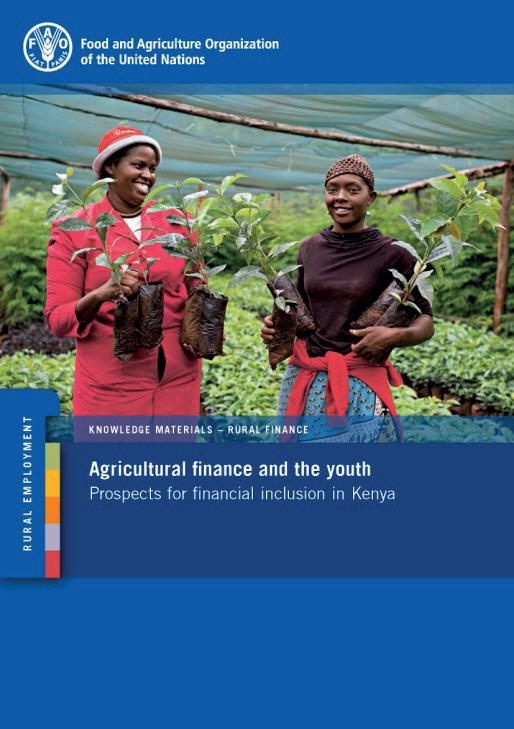
Download publication
Cite this content as: Benni, N., Berno, D. & Hitomi, H. 2020. Agricultural finance and the youth: prospects for financial inclusion in Kenya. Rome, FAO.

Responsible investments in agriculture and food systems – A practical handbook for parliamentarians and parliamentary advisors
Type of publication: Book Author: FAO and IISD Publisher: FAO and IISD Year of publications: 2020 Place of publication: Rome, Italy Other Entities Involved: The International Institute for Sustainable Development Pages: 118 p. ISBN: 978-92-5-133589-5 doi: https://doi.org/10.4060/cb1991en
Agrovoc: responsible investment; responsible investment in agriculture; agrifood systems; sustainable agriculture; governance; legislation
Abstract: This Practical Handbook is directed to Members of Parliament and Parliamentary Advisors, who are considered “change agents”. It provides a comprehensive and systematic overview of the role that Parliamentarians can play in the creation of reliable, coherent, and transparent “enabling environments” in the range of areas related to investment in agriculture and food systems. The Handbook does so, not through a catalog of prescriptions, but through guidance notes, examples of good practices, and very practical indications. It does not aim to provide a blueprint to be implemented by each Parliament but rather it sets out key stages of processes and mechanisms for MPs and advisors to consider while promoting responsible investment in agriculture and food systems. Part 1 of the Handbook presents the
LibraryNewsletter OrganicAgriculture Newsletter Economic Books Fisheries Agriculture Food and nutrition Aquaculture Natural resourcesMAIBDocumentation Center Documentation Center Mediterranean Agronomic Institue of Bari N° 1 - 2021 - January-Februarywww.iamb.it
Principles for Responsible Investment in Agriculture and Food Systems and explains: why there is an urgent need to enhance responsible investment in agriculture and food systems: high levels of malnutrition and poverty (exacerbated by the impact of the COVID-19 pandemic), population growth and urbanization, increasing demand for more resourceintensive diets, climate change, and its severe impacts; what is responsible investment in agriculture and food systems: “Responsible investment in agriculture and food systems contributes to sustainable development by generating positive socio-economic and environmental impacts, enhancing food security and nutrition. It requires progressively respecting, protecting and fulfilling human rights”; and how can it contribute to the achievement of the Sustainable Development Goals (SDGs) and national development plans - scaling up support to small scale farmers, engaging and empowering youth, closing the gender gap, and improving access to infrastructure, public services, and agricultural finance, and, in general, investing in the sustainable production of safe and nutritious food while contributing to improving inclusion in the food system, prioritizing vulnerable populations and adopting a human rights-based approach to food security, in line with the SDGs spirit of addressing inequalities and ensuring that no one is left behind. In Part 2, through specific Guidance Notes, Parliamentarians and advisors are guided through concrete actions they can implement in their countries to improve and increase investments, actions such as: executing a national policy, legislative, and institutional frameworks assessment; ensuring consistency in the legal and policy framework; advocating to reform existing laws and/or adopt new laws; ensuring adequate financing for the implementation of laws related to responsible investments in agriculture and food systems and ensuring effective parliamentary oversight are detailed throughout. In addition to their essential role for the enactment of legislation and adoption of budgets, and of ensuring accountability of governments for the effective implementation of commitments, parliamentarians, and parliamentary advisors are custodians of their country’s plans for sustainable development and have a strategic responsibility to raise awareness of citizens on issues of paramount importance. To support parliamentarians and advisors in creating effective partnerships with other stakeholders, such as other parliamentarians, the private sector, the civil society, and academia, Part 3 provides tailored key messages that can be used ad hoc in meetings, conferences, and in other kinds of communications such as reports, press releases, and social media. It includes useful explanations of how data and country-level statistics can support advocacy and communication activities.
Download publication
Cite this content as: FAO and IISD. 2020. Responsible investments in agriculture and food systems – A practical handbook for parliamentarians and parliamentary advisors. Rome.
back to index
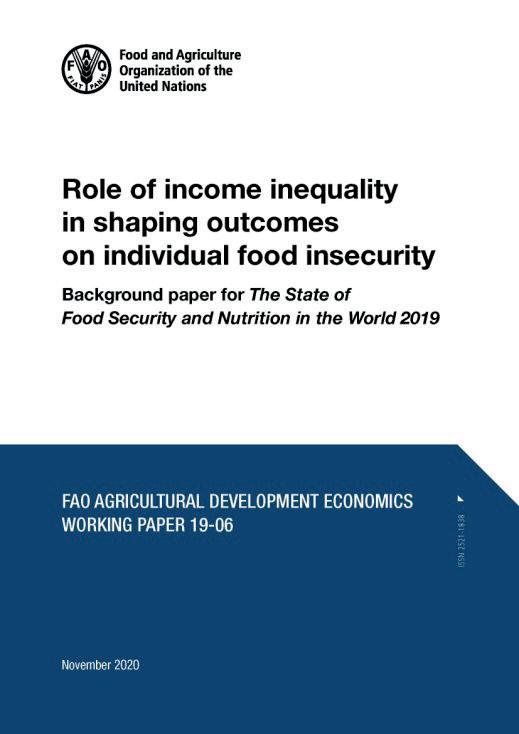
Role of income inequality in shaping outcomes on individual food insecurity. Background paper for The State of Food Security and Nutrition in the World 2019 - FAO Agricultural Development Economics Working Paper 19-06
Type of publication: Book Author: Holleman, C., Conti, V. Publisher: FAO Year of publications: 2020 Place of publication: Rome, Italy Pages: 44 p. ISBN: 978-92-5-133609-0 Serial Title: FAO Agricultural Development Economics Working Papers ; 19-06 doi: https://doi.org/10.4060/cb2036en
Agrovoc: income distribution; economic growth; food security; impact assessment; analysis; Developing countries
Abstract: Despite relatively high economic growth rates in many developing countries in the last two decades, income inequality has remained high and even increased. This has important policy implications as high-income inequality undercuts the benefits of economic growth in reducing food insecurity. This paper uses the 2014 Gallup World Poll (GWP) dataset of individual food insecurity based on the Food Insecurity Experience Scale (FIES) and employs a three-level linear probability model to assess the macro-economic effects of economic growth and income inequality
LibraryNewsletter OrganicAgriculture Newsletter Economic Books Fisheries Agriculture Food and nutrition Aquaculture Natural resourcesMAIBDocumentation Center Documentation Center Mediterranean Agronomic Institue of Bari News DOCUMENTATION CENTRE - CIHEAM BARI from the Library
on individual food insecurity. Results show that increases in the gross domestic product (GDP) per capita are concurrent with declines in individual food insecurity. However, income inequality increases the likelihood of food insecurity, and where there is economic growth it undercuts the positive effect of economic growth on individual food security. The findings suggest that by tackling income inequality, economic growth can become a force for reducing food insecurity, especially in low- and middle-income countries.
Download publication
Cite this content as: Holleman, C. & Conti, V. 2020. Role of income inequality in shaping outcomes on individual food insecurity. Background paper for The State of Food Security and Nutrition in the World 2019. FAO Agricultural Development Economics Working Paper 19-06. Rome, FAO.

The impact of climate variability and extremes on agriculture and food security - An analysis of the evidence and case studies. Background paper for The State of Food Security and Nutrition in the World 2018.
Type of publication: Book Author: Holleman, C., Rembold, F., Crespo, O. & Conti, V. Publisher: FAO Year of publications: 2020 Place of publication: Rome, Italy Pages: 108 p. ISBN: 978-92-5-133718-9 Serial Title: FAO Agricultural Development Economics Technical Studies ; 4 doi: https://doi.org/10.4060/cb2415en
Agrovoc: climate change; extreme weather events; food security; agricultural sector; analysis; case studies
Abstract: Global climate studies show that not only temperatures are increasing and precipitation levels are becoming more varied, all projections indicate these trends will continue. It is therefore imperative that we understand changes in climate over agricultural areas and their impacts on agriculture production and food security. This study presents new analysis on the impact of changing climate on agriculture and food security, by examining the evidence on recent climate variability and extremes over agricultural areas and the impact of these on agriculture and food security. It shows that more countries are exposed to increasing climate variability and extremes and the frequency (the number of years exposed in a five-year period) and intensity (the number of types of climate extremes in a five-year period) of exposure over agricultural areas have increased. The findings of this study are compelling and bring urgency to the fact that climate variability and extremes are proliferating and intensifying and are contributing to a rise in global hunger. The world’s 2.5 billion small-scale farmers, herders, fishers, and forest-dependent people, who derive their food and income from renewable natural resources, are most at risk and affected. Actions to strengthen the resilience of livelihoods and food systems to climate variability and extremes urgently need to be scaled up and accelerated.
Download publication
Cite this content as: Holleman, C., Rembold, F., Crespo, O. & Conti, V. 2020. The impact of climate variability and extremes on agriculture and food security – An analysis of the evidence and case studies. Background paper for The State of Food Security and Nutrition in the World 2018. FAO Agricultural Development Economics Technical Study No. 4. Rome, FAO.
LibraryNewsletter OrganicAgriculture Newsletter Economic Books Fisheries Agriculture Food and nutrition Aquaculture Natural resourcesMAIBDocumentation Center Documentation Center Mediterranean Agronomic Institue of Bari N° 1 - 2021 - January-Februarywww.iamb.it
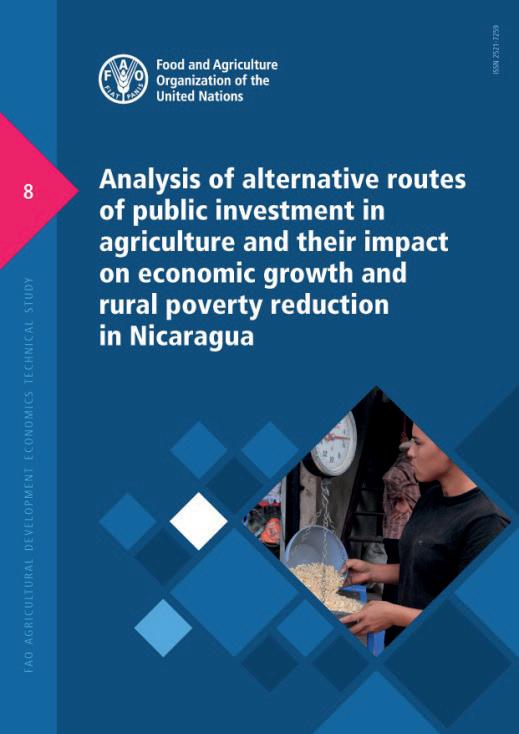
Analysis of alternative routes of public investment in agriculture and their impact on economic growth and rural poverty reduction in Nicaragua
Type of publication: Book Author: Sánchez, M.V. ; Cicowiez, M. ; Ramírez, J. Publisher: FAO Year of publications: 2020 Place of publication: Rome, Italy Pages: 80 p. ISBN: 978-92-5-133351-8 By Country/Territory: Nicaragua Serial Title: FAO Agricultural Development Economics Technical Studies ; 8 doi: https://doi.org/10.4060/cb1149en
Agrovoc: agrifood sector; public investment; impact assessment; rural poverty; production increase; employment; infrastructure; economic growth; simulation models; comparative analysis; Nicaragua
Abstract: In the face of the economic downturn that Nicaragua experienced in 2018 and the need for a recovery, the study provides a comparative analysis of how investments in productive infrastructure in different agri-food sectors would impact growth and poverty. The analysis is based on scenarios generated through an economy-wide model representing the Nicaraguan economy and its sectors. The model includes financing constraints and the study explores different financing options for the new investments.
Download publication
Cite this content as: Sánchez, M.V., Cicowiez, M. & Ramírez, J. 2020. Analysis of alternative routes of public investment in agriculture and their impact on economic growth and rural poverty reduction in Nicaragua. FAO Agricultural Development Economics Technical Study 8. Rome, FAO.
back to index
Trade and Sustainable Development Goal 2 – Policy options and their tradeoffs
Type of publication: Book Author: Gadhok, I. ; Mermigkas; G. ; Hepburn; J. ; Bellman, C. ; Krivonos, E. Publisher: FAO Year of publications: 2020 Place of publication: Rome, Italy Pages: 70 p. ISBN: 978-92-5-133151-4 doi: https://doi.org/10.4060/cb0580en
Agrovoc: trade policies; markets; Sustainable Development Goals; Goal 2 Zero hunger; action plans; investment; agricultural research; extension activities; technology transfer
Abstract: With trade recognized as a means of implementation under Agenda 2030, policy-makers will need to ensure that trade, and policies affecting trade and markets, are taken into consideration as part of their efforts to achieve SDG 2. The five targets that set out the level and ambition of SDG 2 (ending hunger; ending all forms of malnutrition; doubling the agricultural productivity and incomes of small-scale food producers; ensuring sustainable food production systems; and maintaining genetic diversity), as well as trade itself, often constitute distinct policy priorities for governments. Trade and related policy measures that may be designed to achieve one target can potentially have unintended negative consequences that undermine the achievement of other targets, both within the country where the measure is applied and in the trading partner countries. It is therefore important that policy-
